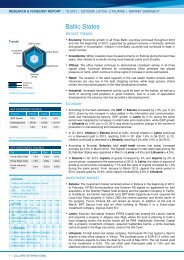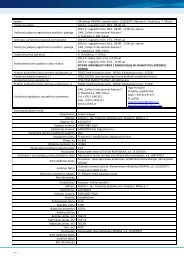baltic states and belarus real estate market review - Colliers
baltic states and belarus real estate market review - Colliers
baltic states and belarus real estate market review - Colliers
You also want an ePaper? Increase the reach of your titles
YUMPU automatically turns print PDFs into web optimized ePapers that Google loves.
Real Estate Market Review 2011 | Latvia Legal Overview<br />
filed with the L<strong>and</strong> Book for registration of the transaction.<br />
Registration applications to the L<strong>and</strong> Book are always drafted by<br />
a notary in Latvian <strong>and</strong> if necessary orally translated by the<br />
notary or another person to the person signing the application.<br />
Due Diligence<br />
Before carrying out any <strong>real</strong> <strong>estate</strong> transaction, it is advisable to<br />
research the legal status of the <strong>real</strong> <strong>estate</strong>, e.g. information on<br />
the title holder, encumbrances, lease agreements, pollution, <strong>and</strong><br />
permitted use as set by the local authority. The results of<br />
research may be useful for settling the final purchase price that<br />
better reflects its value <strong>and</strong> for more accurate assessment of<br />
potential expenses that the buyer is likely to incur on acquisition.<br />
Rights of First Refusal<br />
Before title to <strong>real</strong> <strong>estate</strong> may be transferred, all persons with a<br />
right of first refusal to purchase the particular <strong>real</strong> <strong>estate</strong> must<br />
be offered an opportunity to exercise their right. Only after all<br />
these persons have declined to exercise this right in writing may<br />
the purchase agreement <strong>and</strong> the buyer’s title be registered with<br />
the L<strong>and</strong> Book.<br />
Certain entities’ rights of first refusal are established by law.<br />
However, these rights may also be agreed on by the parties to<br />
the particular transaction. A local authority has right of first<br />
refusal in respect of acquisition of <strong>real</strong> <strong>estate</strong> (l<strong>and</strong> <strong>and</strong><br />
buildings) located in its territory if the <strong>real</strong> <strong>estate</strong> is necessary<br />
for performance by the local authority of its statutory functions,<br />
eg, operation of schools, kindergartens, certain types of social<br />
housing.<br />
The state has a right of first refusal upon sale of cultural<br />
monuments of state importance, l<strong>and</strong> plots in protection zones<br />
as well as in ports <strong>and</strong> special economic zones.<br />
Rights of first refusal also exist in favour of co-owners of <strong>real</strong><br />
<strong>estate</strong> if any of them transfers their notional part of the <strong>real</strong><br />
<strong>estate</strong> to a person who is not a co-owner of the <strong>real</strong> <strong>estate</strong>.<br />
Additionally, where l<strong>and</strong> <strong>and</strong> buildings constructed on it are in<br />
different ownership, the owner of each property has a right of<br />
first refusal over the other owner’s property if it is sold to a third<br />
party.<br />
Rights of first refusal may generally be exercised within two<br />
months after the purchase agreement is delivered to persons<br />
with such rights. Depending on whether the <strong>real</strong> <strong>estate</strong> is or is<br />
not necessary for performance by the local authority of its<br />
statutory functions, the term for local government is 20 days or<br />
five days respectively.<br />
Typical Purchase Price Arrangements<br />
In complex <strong>and</strong> long-term projects, part of the purchase price<br />
(up to 5-10 per cent) might be paid by the buyer to the seller as<br />
an advance payment on signing the purchase agreement.<br />
Normally, the parties agree to use an escrow account with a<br />
bank for payment of the remaining purchase price, in which<br />
event an escrow account agreement is signed by the seller, the<br />
buyer <strong>and</strong> the bank. From conclusion of the purchase agreement<br />
<strong>and</strong> until registration of the buyer’s title to the <strong>real</strong> <strong>estate</strong> none<br />
of the parties has access to the funds transferred to the escrow<br />
account. Generally, the parties agree on a list of documents that<br />
need to be submitted to the bank <strong>and</strong>/or actions that need to be<br />
performed by the seller as preconditions to the purchase price<br />
being transferred from the escrow account to the seller. A L<strong>and</strong><br />
Book certificate evidencing the buyer’s title to the <strong>real</strong> <strong>estate</strong> is<br />
usually the main document in the list.<br />
Related Costs<br />
Sharing of costs related to the transaction is a matter for<br />
agreement between the parties. Usually, the buyer pays state<br />
<strong>and</strong> stamp duties, whilst notary fees are shared equally between<br />
the parties.<br />
State duty for registration of title to <strong>real</strong> <strong>estate</strong> amounts to 2 per<br />
cent of either the <strong>real</strong> <strong>estate</strong> purchase price or the cadastral<br />
value of the <strong>real</strong> <strong>estate</strong>, whichever amount is higher.<br />
Nevertheless, state duty may not exceed LVL 30,000 (approx<br />
EUR 42,700). Stamp duty for registration of title <strong>and</strong> issue of a<br />
L<strong>and</strong> Book certificate is LVL 15 (approx EUR 21). Notary fees for<br />
drafting the registration application to the L<strong>and</strong> Book <strong>and</strong><br />
approving the parties’ signatures amount to LVL 65 (approx<br />
EUR 92).<br />
Restrictions<br />
Restrictions on Acquisition of Real Estate<br />
Certain restrictions exist as to foreign ownership of l<strong>and</strong>, while<br />
there are no such restrictions regarding ownership of buildings.<br />
However, since a building erected on l<strong>and</strong> is generally considered<br />
to be a part of the l<strong>and</strong>, in most cases ownership of buildings is<br />
subject to the same regulations (restrictions) as is the l<strong>and</strong>. Few<br />
restrictions apply as to foreign ownership of l<strong>and</strong> located in<br />
cities in Latvia, while the regulations are more stringent with<br />
regard to the ownership of l<strong>and</strong> in rural areas.<br />
ĢIRTS RŪDA<br />
Partner, Regional Head of the Real Estate & Construction Team<br />
SORAINEN Latvia<br />
Kr. Valdemāra iela 21, LV-1010 Riga, Latvia<br />
Phone +371 67 365 006<br />
Girts.Ruda@sorainen.com<br />
BALTIC LAW FIRM OF THE YEAR<br />
Awarded by:<br />
Financial Times & Merger<strong>market</strong><br />
International Financial Law Review<br />
PLC Which lawyer?<br />
International Tax Review<br />
p. 23













